The time came, and I was finally able to travel to Barcelona. The Catalan capital was never high on my travel list, but sure, I wanted to visit. Someday.
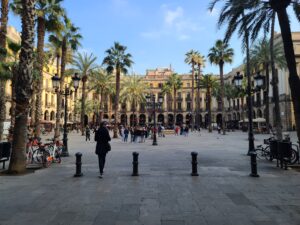
Over the course of several years, I heard from friends, relatives and other travel bloggers that Barcelona is nothing short of spectacular, cool, fun and, unequivocally, a “favorite place in Europe.”
The opportunity arose, and my wife and I made our way to Barcelona during a trip to Spain. Despite the hype and resounding endorsements, I tempered my expectations. I made an attempt to do so, anyway. To be fair, my knowledge of the city was limited mostly to Sagrada Familia, other Gaudi marks on the cityscape, FC Barcelona, the ‘92 Summer Olympics (which I was far too young to actually recall), beaches and the Catalan independence movement.
Of course, I did tons of research beforehand. By the time we got off the high-speed train from Madrid, there was a lot more that I wanted to check out.
After a week in the city, having checked off boxes and seeing much more, I couldn’t help feeling a little disappointed as we took the train back to Madrid. After all of the glowing reviews, that is what everyone is raving about?
Parts of the city are cool, the food is good and the weather is nice. Still, it certainly didn’t live up to the greatness about which I heard and read.
Barcelona, for me, did not live up to the hype. Before I get into the specifics, there is relevant background information that played a part in my experience and also impacts locals and other tourists.
For those who don’t know, Barcelona is the 2nd-largest city in Spain. Located in the northeast of the country along the Mediterranean Sea, it is the capital of the region of Catalunya, a region that is quite different from other areas of Spain. I’m not here to discuss Catalan politics, but it is an important thing to note about the city.
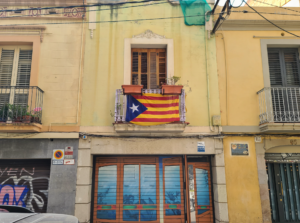
Barcelona is one of the most popular tourist destinations in the world. Sources vary, but the city received an estimated 12-15 million tourists in 2023. That’s in addition to the roughly 1.6 million people who call the city home. And it’s not a sprawling city; in fact, Barcelona has a population similar to the cities of Munich and Philadelphia, but those cities cover 3 and 3.5 times more area, respectively.
In other words, Barcelona is an extremely densely-populated city, the most densely-populated in Europe. Essentially, that’s a large amount of people in a not-so-large space. Oh, and that’s before accounting for the 12-15 million additional visitors.
A tightly-packed urban center is not necessarily a bad thing. Sure, you can expect a lot of people, but it also ensures that you probably won’t have to go far to get from point A to point B. And you’re sure to find a fun, urban-living vibe to explore.
There’s definitely a vibe to the city, and that’s another important trait to note. I’ll get back to this later.
First, I want to break down different aspects of the city.
Contents
Stunning, Unique Architecture… Kind Of
Barcelona is noteworthy as the home of some peculiar and stunning architecture. Most famous for the mark architect Antoni Gaudi’s left on the city, Gaudi’s creations are rather few among the cityscape that is an urban center with millions of people and thousands upon thousands of buildings.
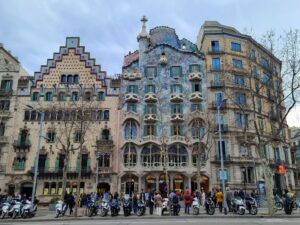
It’s cool to see the Gaudi buildings. I’ve only seen them in textbooks and on TV shows. So I sought them out, stood there and thought, “That’s really cool!.. now what?”
What I’m trying to say is that a couple of weird buildings stand out, but they are hardly representative of the city as a whole.
To be fair, there is some really cool architecture. To name an obvious choice, Sagrada Familia is spectacular and worth a visit. Whether or not it justifies a trip to Barcelona on its own – maybe, maybe not. We’ll have a guide posted about it soon, so be sure to keep a look out for that.
There are certainly other beautiful buildings to behold. But as a whole, Barcelona lacks the European charm in its architecture that attracts millions of visitors to other cities across the region.
Viewed from above, Barcelona is not the most beautiful city. In fact, it’s pretty bland. In truth, most of the city is not that old. What is interesting is the city planning and overall design. The purposely-designed city blocks in the Eixample district might be unsightly, but it is a brilliant planning idea. The corners of the blocks were cut off, making each ‘block’ an octagon and opening up sections of sidewalk and intersections. It gives the city a more open feel despite the overcrowding.
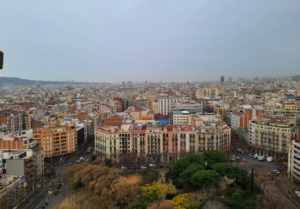
While these octagonal blocks and other parts of the city are interesting, it’s largely pretty bland. From my perspective, the most attractive portions of Barcelona have been damaged by mass tourism.
This brings us to the next point of why Barcelona is a bit disappointing.
Too Many Tourists
Barcelona is overwhelmed by tourists. Yes, I recognize the irony (perhaps hypocrisy) of this point. I, too, was one of the “too many” tourists in Barcelona. The point remains true.
But I wanted to see for myself what the fuss was all about, and I was genuinely looking forward to the visit.
The tourists in this place are too many, especially in the city center, but it’s hard to escape massive crowds all over the place. And this is even when considering that I was told by a local that it was the offseason. Really, it was probably the shoulder season, but that’s splitting hairs.
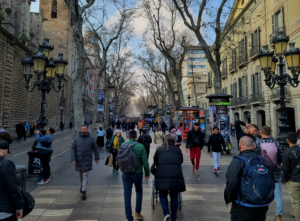
Anyway, there are too many tourists in Barcelona. So many, in fact, that it takes away from the enjoyment of the city. The Gothic Quarter, truly the would-be coolest part of the city, has been trivialized by the hordes of people, troupes of drunken tourists and too many of the tacky tourist shops that belong in Vegas or on Bourbon Street.
In and around the Gothic Quarter, it’s street after street with tens of thousands of people. Throw in the occasional non-local harassing you to buy some knock-off piece of junk when you stop for a moment to try and appreciate a particular sight, it’s hard to enjoy. I can really understand why the people of Barcelona are fed up with overtourism.
Higher Prices
We didn’t travel to Barcelona to party. Maybe that was the mistake, but that’s not really where my interests lie. Hostels are always my preferred choice of accommodation, but it wasn’t a realistic option in Barcelona.
There is no shortage of hostels in Barcelona. I’m sure there are laid back options that aren’t party-focused, but I didn’t have any luck finding these. The options I came across seemed to highlight the nightlife. I enjoy the social aspects of hostels immensely, but it’s hard to adequately explain how little interest I have in clubs.
This isn’t exactly conducive to my style of travel – a version of aimless slow travel, led by curiosity, that largely centers around a personal culinary exploration.
Anyway, these kinds of hostels aren’t my style. Even if they were, the prices for a bed in a dorm were outrageous. Seeing the rates for private rooms left me scratching my head. Why would anyone pay over €100 a night to stay in a hostel? And these were prices in the so-called offseason.
Unfortunately, with hostels out of the equation, the focus turned toward hotels. There are hundreds, probably thousands, of hotels in Barcelona. These come in all shapes and varieties. I opted for a hotel about 30 minutes (walking) from the Gothic Quarter. Aside from this hotel, there was no obvious reason for tourists to be in the area.
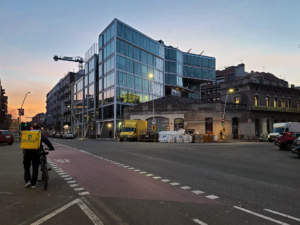
The cost was a little more than €165 per night. It was nice but very small and bare bones. All in all, that’s not terrible. But when I factored in the distance from anything of interest and the lack of amenities, it looked a lot more expensive. However, for a decent, safe(ish), clean place, this was one of the few options. Anything better – be that a better location, inclusive of breakfast, nicer or whatever that may entail – was considerably more expensive.
To be fair, I’d rather spend €165 for a night in an uninspiring Barcelona neighborhood than the same price (probably higher) for a night next to a highway 20 miles outside of Nashville or Detroit. No offense to Nashville or Detroit, but I’m choosing Barcelona. Of course, comparable accommodation in either of those cities would be more expensive and less walkable than Barcelona anyway.
There were cheaper hotels available, but the choices were grim. In hindsight, I’m actually happy I wasn’t staying nearer to the Gothic Quarter, as I found much more enjoyment in other areas of Barcelona.
Food in Spain is generally affordable. You can get fantastic food for a fair price. Prices in Barcelona did seem higher to me than anywhere else I’ve been in the country. Obviously, this holds true near the tourist areas. Overall, meals were generally more affordable than much of the USA but less so than elsewhere in Spain.
If I were to make a detailed travel budget, I would probably allot daily costs in Barcelona roughly 30% more than Madrid and double what you might pay for a day in Andalucía.
There is No Offseason
Barcelona doesn’t really have much of an offseason. Traveling in early Spring, I predicted I would find the city quieter than peak travel times of Summer.
My hypothesis was found to be slightly accurate.
Apparently, this was the slower period of ‘low season’ in Barcelona. Could have fooled me.
Commenting to a local about the crowds and how I would have liked to visit during a quieter time, I was met with a laugh. “This is the low season and nothing compared to Summer.”
How could this be? There are streets where you can hardly traverse through the crowds. Most restaurants are packed. Prices are still high!
Upon further questioning, he explained that the tourists never really stop coming. Cooler months, times you might expect thinner crowds, see plenty of visitors hoping to escape the cold in their home country. It also attracts people like me, hoping to visit during a calmer time.
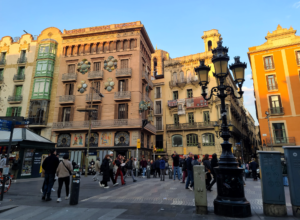
Summer – well, Summer just attracts everyone from everywhere. This includes more docking cruise ships, and they inundate the city with thousands of tourists each day.
What I learned in this brief back-and-forth was that Barcelona is always in-season. I don’t blame anyone for visiting whenever they so choose. Barcelona has great weather for much of the year and a vibrant culture in a beautiful region of Spain.
For me, however, it’s a serious turn off. I try to avoid excessive crowds. It’s not always practical, but that’s my preference.
Furthermore, I can’t help but feel for the locals. It’s hard to imagine how such large numbers of tourists impact the quality of life for residents. Sure, the bottom line goes up. But for whom? There are profits, yes, but I’ve delved into economics of the travel world enough to know that those benefiting from mass tourism in Barcelona are likely not the majority of Barcelonans.
For the record (again), I’m not a socialist or an anti-capitalist. I am pro-local. Whenever I can, I prefer my spending to go to locally-owned and operated small businesses.
Redemption
The millions of tourists who travel to Barcelona don’t ruin everything about this famous destination. There are certainly still reasons to visit, primarily the weather and food.
If one was determined to visit a Mediterranean metropolis with little concern otherwise, this is an easy choice. The weather is pleasant, and it is a city. Flights are abundant and frequently cheap. The best part about this might be to use Barcelona as a natural gateway to more interesting parts of Catalunya or the Spanish Mediterranean Coast.
What’s not bland in Barcelona is the food. Spanish food is good. Very good. It’s some of the best in the world, and that is something I will stand by forever. In Barcelona, the cuisine is a great blend of standard Spanish fare with a healthy dose of Catalan and Mediterranean influences.

Jamon is in ample supply, so there’s no need to worry about that. Most staples of Spanish cuisine are prevalent in Barcelona. Catalan specialties may not dominate menus like they do elsewhere in the region, but local eats are still there for the tasting. Tourism, among other things, is the likely cause for the preference and prevalence of non-Catalan food; however, local specialties are easier to find away from tourist areas.
It’s all about the hunt. With a little patience, you can find those great local spots to relax and enjoy the cuisine of Barcelona. Stay tuned for our Barcelona Food Guide coming soon!
So What is the Attraction of Barcelona?
Remember that “vibe” I mentioned earlier? I think that is what attracts people to this Mediterranean metropolis.
Parts of the city are old and attractive, yes, but it’s not like walking through a giant open air museum, a la Rome. The streets don’t have the charm of a town in Provence, the history of Prague or beauty of Amsterdam. Personally, I think other cities in Spain like Granada or Seville are far more interesting.
Rather, the attraction of Barcelona for so many people is the vibe. The free-spirited, laze-in-the-sun-between-nights-of-partying atmosphere – I think this is what attracted so many of the people who shared their first-hand love affair of Barcelona with me.
That attitude sounds fine to me. I get it. It’s a chill place to be with nice weather and plenty of fun to be had. The food is great.
I suppose I have a different idea of fun and different travel priorities. That’s okay, too.
Barcelona, Round 2?
With the let down of my visit, would I ever consider another trip to Barcelona?
Yes. Absolutely. I honestly hope to return.
It’s not a high priority, but I did find areas of Barcelona that I enjoyed. And, while a week in a small area does afford one plenty of time to get a thorough taste, I am well aware that there remains a lot of the city which I did not experience.
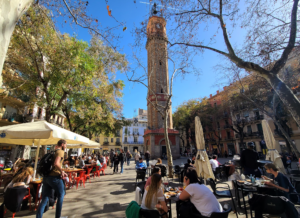
I was not miserable, nor did I ever let my optimism or excitement at the start of each day fade. When the food is good, I always manage to enjoy myself in the moment. It was/is upon reflection at the end of each day and since our visit that I have the feeling of being underwhelmed. It is entirely possible to enjoy yourself just about anywhere, even when the destination might not live up to its reputation. My wife and I had a fun trip, and she very much liked the city.
Barcelona will also serve as a good base to explore the surrounding area. Should I have the opportunity to one day see more of Catalunya, which is high on my list, it’s only natural that would include more time in Barcelona.
Although it is struggling to cope with overtourism, Spain’s most popular tourist destination has its redeeming qualities. The unique blend of Catalan and greater Spanish cuisine is excellent. The weather is an undeniable attraction. Less tourism-inundated neighborhoods of the city maintain, at least for the time being, a certain undeniable appeal.
Travel is about having our own, unique experiences exploring the world. If every trip was the same, there would be little reason to get off the couch. The internet and books would suffice.
Thankfully, no two travel experiences are identical.
Barcelona was a disappointment for my first visit. Based on the millions of people who have a starkly different opinion, though, I can surmise that my opinion is very much in the minority.
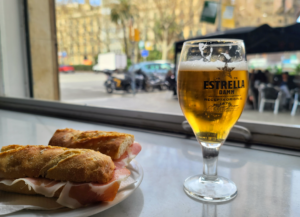
That said, it’s important to remember that most of the travel content we see is a cherry-picked, polished glimpse into a much larger adventure. The negative side of travel is less broadcasted. Sharing of the mundane aspects is even less frequent.
Most of what I see and hear about Barcelona is nothing short of travel paradise. My visit reminded me, once more, that sometimes you have to see something for yourself. It’s far from a perfect tourist destination, and I believe this is important to share, too.
Spain is one of my favorite travel destinations in the world. I’ve been there multiple times, and I plan to return again and again. Barcelona may not be my favorite place in Spain, but I will keep an open mind. I look forward to the next visit and the all-important second impression.
Leave a Reply
You must be logged in to post a comment.